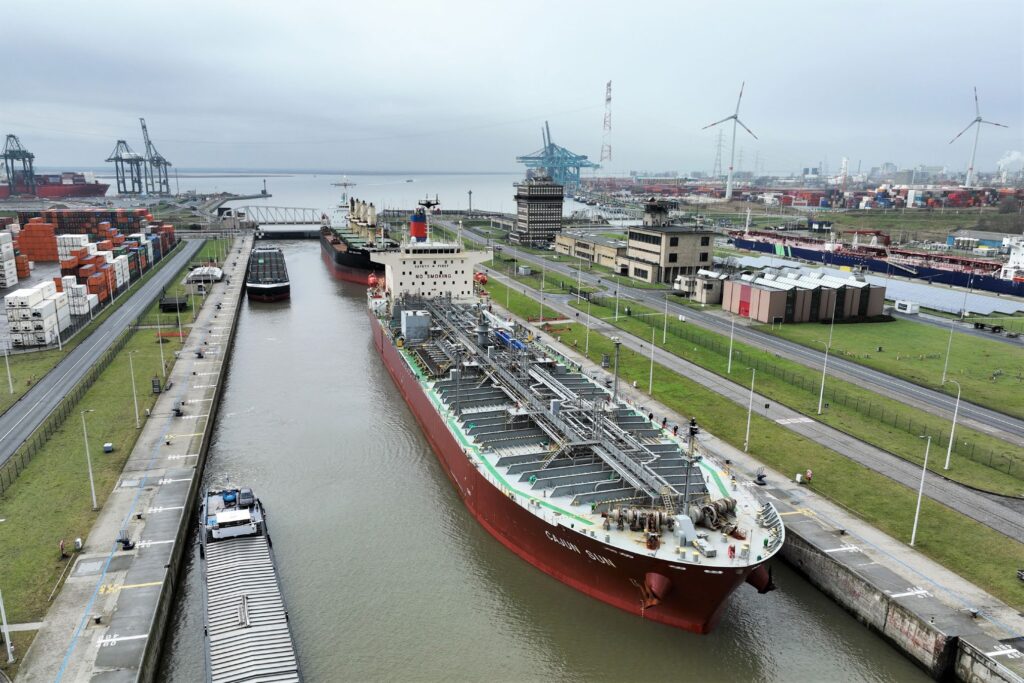Methanol as a Marine Fuel
The use of methanol as an alternative marine fuel was pioneered by Methanex’s subsidiary Waterfront Shipping and its shipping partners. Methanol is a safe, proven, cost-competitive marine fuel for the commercial shipping industry that can meet or exceed current and planned emissions regulations. Shipping accounts for nearly 3 per cent of global GHG emissions and there is growing global demand for lower-emission marine fuel. With methanol available at over 125 of the world’s largest ports, its use as a marine fuel can help the shipping industry meet increasingly strict air emissions regulations.
Why Methanol as a Marine Fuel?
| 95% | Methanol can reduce SOx and PM emissions by more than 95 per cent, and NOx by up to 80 per cent compared to conventional marine fuels. |
| Carbon Neutral Potential | Biomethanol and e-methanol can become low-carbon on a life-cycle basis. |
| 125+ | Methanol is available at more than 125 of the world’s largest ports.
|
One of the unique and important qualities of methanol compared to other alternative fuels is it is a liquid fuel under ambient conditions. This makes methanol easy to transport, store, and bunker using standard safety procedures that are similar to the well-established procedures for diesel. Therefore, the cost of converting diesel engines to methanol dual-fuel vessels and land-based infrastructure to store and supply methanol is significantly lower than other alternative fuels that require pressurization or cryogenics. Methanol also has a higher volumetric energy content than alternative fuels like ammonia or hydrogen, making it a better choice for a wide range of vessel types and longer voyages, as it requires less frequent bunkering. The advantages of methanol make it a leading alternative fuel choice for today and the future while offering the shipping industry a clear pathway to decarbonization. In the short term, conventional methanol reduces greenhouse gas emissions from combustion, while in the longer term, green methanol can enable the industry to meet the International Maritime Organization’s decarbonization goals. As green methanol is chemically identical as conventional methanol, there are no compatibility issues or further engine investment required by shipping companies, allowing a seamless, gradual transition to lower CO2 emissions. Methanex has the capability of producing renewable natural gas-based bio-methanol at our ISCC-certified Geismar facility providing shipping companies with an option to procure green methanol today. To read more about different methanol types and production methods, please see the How Methanol is Produced page.
Growing Momentum for Methanol as a Marine Fuel
Industry interest in methanol as a marine fuel is rapidly growing, leading to commitments from some of the world’s largest shipping companies. Methanex has been the leader in advancing the use of methanol in the shipping industry for over a decade.

*This graph is up to date as of the 2023 Sustainability Report.
Pioneering Methanol as a Marine Fuel
Methanex and our subsidiary Waterfront Shipping (WFS) have been supporting the development of methanol as a marine fuel technology since 2013 and demonstrating the feasibility and safety of methanol as a marine fuel since 2016.
Feasibility in our own ships – WFS began supporting MAN Energy Solutions’ development of dual-fuel engine technology in 2013. WFS has been operating methanol dual-fueled ships since 2016, accumulating more than 200,000 operating hours while running on methanol. By the end of 2023, more than 60% (19 vessels) of our operating fleet are dual-fuel vessels. For additional information, please visit the Waterfront Shipping website.

Supporting the transition to net-zero emissions – In February 2023, the dual-fuel vessel Cajun Sun, operated by WFS and chartered from MOL, completed the first-ever net-zero voyage fuelled by bio-methanol. By blending ISCC-certified bio-methanol that has negative carbon intensity with natural gas-based methanol, net-zero greenhouse gas emissions on a lifecycle basis were achieved for the 18-day trans-Atlantic voyage. This innovative fuel solution, produced at our ISCC-certified plant in Geismar, offers shipping companies the ability to achieve net-zero carbon emissions today, supporting the industry’s transition to a low-carbon future.
Bunkering safety – Since 2016, Waterfront Shipping has been bunkering methanol from most of our production sites, and we continue to demonstrate methanol bunkering in an increasing number of ports that have methanol infrastructure, including Houston, USA; Ulsan, Korea; and Taicang, China. In 2021, Waterfront Shipping led the first barge-to-ship methanol bunkering operation at the Port of Rotterdam. In 2023, Methanex, Stena Line and the Port of Gothenburg collaborated to successfully complete the first non-tanker ship-to-ship fueling operation by bunkering the world’s first methanol ferry, the Stena Germanica.
The “Last-mile Challenge” – While methanol is available at several ports, the industry continues to face the “last-mile challenge”, a term commonly used to describe the difficulties in establishing the last stretch of logistics needed to deliver new fuels to customers, such as methanol onto vessels. For methanol, regulations are still being developed to support bunkering. We work with several organizations around the world to develop methanol safety guidelines. In China, we participated in a review panel for Interim Rules on Technology and Inspection of Methanol/Ethanol Fueled Ships published by the Chinese Maritime Safety Administration in October 2023, and partnered with the China Classification Society to support the development of several safety guidelines including Guidelines for Bunkering of Methanol Fuel for Ships and Guidelines for Construction of Methanol Bunkering Vessels. In Trinidad and Tobago, Methanex has partnered with the National Energy Corporation on a feasibility study and demonstration project of methanol as reduced-emissions marine and vehicle fuel for the region. In Europe, Methanex is a partner in FASTWATER, a consortium of 14 organizations advancing the use of methanol in waterborne transportation. For more information about methanol as a marine fuel, contact [email protected].

